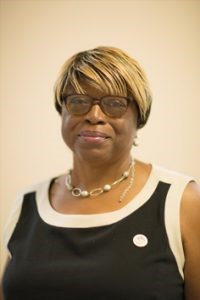
Among the “Ten Demands” that SOULS presented to ECU President Leo W. Jenkins in the spring of 1969 was one for the hiring of African American faculty. At the time, there were none. A year later, Mary Lawrence Perkins (married name, Perkins-Williams) became one of the first African Americans working on campus in a capacity other than maintenance, housekeeping, and the cafeteria staff. Having completed, in 1970, a bachelor’s degree in business at North Carolina Central University, Perkins-Williams was hired as a librarian in Joyner Library. In 1987, she completed a master’s degree in library science at the University of South Carolina. During her nearly three decades of professional service at ECU, from 1970-1998, she contributed significantly to documenting African American history in Greenville and Pitt County helping to establish strong foundations for later research on African American history at the local level.
The Mary Lawrence Perkins-Williams Papers housed in the Joyner Library Manuscript Collection well document, with photographs from a scrapbook dating from the 1950s, dozens of African American schoolhouses, many of them “Rosenwald schools,” built in the early twentieth century. Most of these schools were rudimentary wooden structures, some including only a single classroom while others boasted as many as nine. Many of the schools were known as “Rosenwald schools” because they were financed in part by Julius Rosenwald (1862-1936), a wealthy philanthropist who had made a fortune through his leadership of Sears Department Stores. Impressed by Booker T. Washington’s Tuskegee Institute, Rosenwald provided matching funds for school districts throughout the South willing to build and otherwise finance schools for African Americans. Between 1919 and 1924, twelve Rosenwald schools were constructed in Pitt County – in Ayden (2), Bethel, Cherry Lane, Farmville, Greenville, Harris, Pactolus, Pauls, Post Oak, Shelmerdine, and Simpson. Among the photographs in the Perkins-Williams Papers are ones of these schools, long since demolished and replaced by newer, more modern facilities.
The Perkins-Williams collection also includes seven videocassette recordings made as part of a grant-funded oral history project entitled “Growing up African-American in Pitt County,” completed in 1994, in collaboration with Joyner librarian, Mary Boccaccio. The recordings include interviews with, among others, prominent African Americans such as George Garrett, Lucille Gorham, Geneve Atkinson, Bessie W. Harris, Robert L. Cherry, and Frank Perkins. As with the collection of photographs of African American schools, “Growing up African American in Pitt County” is an invaluable resource for the study of black history in Greenville and eastern North Carolina.
Since retiring from ECU, Perkins-Williams has been an outstanding exemplar of the university’s ethic of service as regional director of the North Carolina African American Caucus, as regional director of the Pitt County Board of Social Service, as a member of the Pitt County Council on Aging, and as a member of the Greenville Fair Housing Task Force. In 2014, Perkins-Williams was elected to the Pitt County Commission, becoming the first African American woman to serve as a county commissioner. Representing Pitt County’s Second District, Perkins-Williams voted in favor of the removal of the Confederate statute from the Pitt County Courthouse grounds. Perkins-Williams has also been a strong advocate for the establishment of a Pitt County Human Relations Council. As a librarian at ECU and later as a successful historic political figure, Perkins-Williams has contributed to Pitt County’s progress well into the twenty-first century.
Sources
- Armstrong, R. D. “Progress Has Been Made In Local Negro Education.” Rocky Mount Telegram. March 31, 1957. P. 5B.
- Davenport, Bessie. “State Leading Negro Schools: North Carolina Has 494 Rosenwald Schools and Fourteen Teachers’ Homes.” News and Observer. September 6, 1925. Pp. 1, 3.
- Lassiter, Tom. “The Rosenwald Schools of North Carolina.” EdNC. https://www.ednc.org/the-rosenwald-schools-of-north-carolina/
- “Leo Jenkins looking at cartoons.” Date: June 30, 1978. University Archives # UA55.01.1837. J. Y. Joyner Library. East Carolina University. Greenville, N. C. http://digital.lib.ecu.edu/23167
- Mary Lawrence Perkins-Williams Papers. Circa 1950s-1998, undated. Manuscript Collection #730. J. Y. Joyner Library. East Carolina University. Greenville, N. C. https://digital.lib.ecu.edu/special/ead/findingaids/0730
- Maschal, Richard. “The Legacy of Julius Rosenwald: His Schools Gave Local Blacks Hope.” Charlotte Observer. February 16, 1986. Pp. 1E, 10E.
- Power, Scott. The Historic Architecture of Pitt County, N.C. Pitt County, N.C.: Pitt County Historical Society, 1991. Pp. 217, 223, 487-88.
- Reflector Staff. “Commission races: Williams wins.” Daily Reflector. May 7, 2014.
- Reflector Staff. “Human relations council rejected.” Daily Reflector. April 14, 2015.
- Reflector Staff. “Editorial: Boards see winds of change.” Daily Reflector. December 2, 2014.
- Rosenwald Schools in North Carolina. North Carolina Museum of History. https://www.ncmuseumofhistory.org/rosenwald-schools-north-carolina
- State Education Commission. Public education in North Carolina: A Report by the State Educational Commission. Raleigh: Edwards and Broughton, 1920. P. 17. https://digital.lib.ecu.edu/16886
Citation Information
Title: Mary Lawrence Perkins-Williams
Author: John A. Tucker, PhD
Date of Publication: 3/1/2021